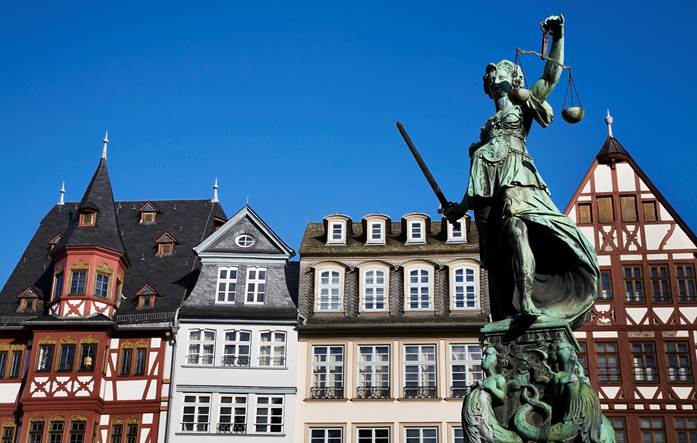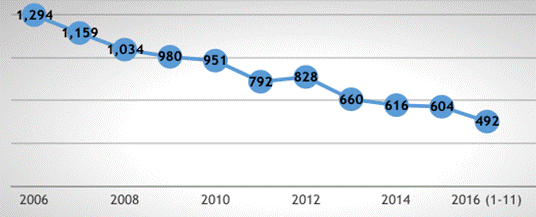
Figure 1: The Fountain of Justice in Frankfurt; Photo © Jorge Royan CC BY-SA 3.0
The dual track of revocation procedure and infringement procedure has been one of the remarkable features of the patent system in East Asia, particularly in Taiwan, China, Japan and South Korea. Taking Taiwan as an example, patent law follows the bifurcation principle (or double-track, “Trennungsprinzip”) which originated from the German legal system. Patent prosecution and validity issues are administrative matters, whereas disputes concerning patent infringement are adjudicated by ordinary civil courts in accordance with tort law principles. Before the Intellectual Property Court, officially launched operations in July 2008, administrative (including validity decisions) and civil procedures were held in parallel. Since 2008, however, the IP court handling a patent infringement case is entitled to decide whether the patent rights at issue are valid or not, without waiting for the revocation decision of administrative authorities. Under these circumstances, there is interplay between the infringement and revocation proceedings which leads to complex issues. One of them is whether there is room for rehearing a case in which there is disagreement between administrative and civil actions about the validity of the same patent. The Supreme Court adjudicated on this issue recently (See 2015 Supreme Court No. 407 Civil Appeal Judgement).
Separation and Interplay in a Bifurcated System
In the bifurcated system, disputes over validity are administrative matters governed by administrative proceedings. Unlike the inter partes invalidation procedures in Germany and Japan, those who wish to invalidate a patent that has already been granted by the Taiwan Intellectual Property Office (TIPO) only have recourse to the ex parte revocation procedure and TIPO is always the named defendant party to the proceedings. This means any party who believes that an invention should not have been granted a patent may make a request for revocation with TIPO (Article 71(1) of the Patent Act). If TIPO decides that there should be a revocation, the patentee in question may seek remedy from the Board of Appeals of the Ministry of Economic Affairs (MOEA), the administrative law division of the IP Court, and the Supreme Administrative Court. If, however, TIPO believes a revocation is unnecessary and the patent is valid, the party requesting the revocation also has recourse to the aforementioned administrative remedy proceedings.
As well as deciding validity, ordinary civil courts also adjudicate disputes over patent infringement, which are regarded as a tort pursuant to Article 184 (1) of the Civil Code. General laws, including the Code of Civil Procedure, the Enforcement Act of the Code of Civil Procedure and the Civil Execution Act, are also relevant to patent infringement actions unless otherwise provided for within the Patent Act. Litigation cases are generally tried on first and second instance in the IP Court and this judgement can then be appealed to the Supreme Court.
Under the bifurcated system, neither ordinary civil courts nor the IP Court are allowed to invalidate a patent by a declaratory judgment in patent infringement cases. To avoid a civil action being delayed due to the issue of validity (governed by the administrative proceedings), Taiwan enacted the Intellectual Property Case Adjudication Act (hereinafter “IP Adjudication Act”) in 2008. Article 16 of the Intellectual Property Case Adjudication Act allows the accused infringer in civil actions to raise an invalidity defence. It prescribes:
- When a party claims or asserts that an intellectual property right shall be cancelled or revoked, the court shall decide on this issue based on the merits of the case, and shall not apply provisions concerning the stay of an action of the Code of Civil Procedure, Code of Administrative Litigation Procedure, Trademark Act, Patent Act, Species of Plants and Seedling Act, or other relevant laws.
- Under the circumstances in the preceding paragraph, the holder of the intellectual property right shall not claim any rights during a civil action against the opposing party where the court has recognized grounds for cancellation or revocation of the intellectual property right.
Although Article 16 of the Intellectual Property Case Adjudication Act allows the civil court to decide on the validity of the patent right at issue, its opinion binds only those party to the suit. The revocation process, on the other hand, has the power to invalidate a patent completely. This means that administrative authorities are in a position of more privilege with regard to validity. With the exception of cases in which revocation proceeding have already been exhausted and the patent in question has already been rendered invalid, no one, including an ordinary court examining its validity within the context of a civil action, can deny the effect of patent rights.
The Facts of the 2015 Supreme Court No. 407 Civil Appeal Judgement
In March 2008, Leechi Enterprises Co. (hereafter “Leechi”), the holder of utility model patent 227,463, sued Tektro Metal Inc. (hereafter “Tektro”) for patent infringement. In the course of the first instance, Tektro did not put forward an invalidity defence. The district court ruled in favour of Leechi and awarded NT$5 million (US$162,180) in damages. Tektro appealed to the IP Court and put forward an invalidity defence on second instance. However, the IP Court held that Tektro had violated the principle of pleading within due time and rejected its claim. Tektro appealed to the Supreme Court, which dismissed the appeal as well, and the civil action was finalized in March 2011.
While this was happening, Tektro had filed an administrative revocation action against the patent at issue on the basis of anticipation and obviousness, and TIPO ordered the revocation of the patent in February 2010. The patent holder, Leechi, then appealed against TIPO’s decision. The Board of Appeal of the Ministry of Economic Affairs, the IP Court and the Supreme Administrative Court all denied appeals, and the patent in suit was invalidated conclusively in July 2013. According to Articles 120 and 82(2) of the Patent Act, revocation of a patent right shall become final and binding, when administrative remedy proceedings have been filed and dismissed conclusively. Article 82 (3) of the Patent Act prescribes further that the effect of patent right shall be deemed not to have existed ab initio, where a patent is revoked finally and bindingly.
On the basis of the above-mentioned provisions, Tektro initiated a rehearing action in accordance with Article 496 (1) (xi) of the Code of Civil Procedure and requested the IP Court to review the final judgement, which ruled that patent infringement was established. It believed that Leechi was not entitled to enforce its patent and retain the damages. Tektro argued that the requirement of filing a rehearing was fulfilled, since the patent at issue had been revoked finally and bindingly and the basis of the civil action regarding the issue of patent infringement was amended.
The IP Court (see 2013 Civil Patent Litigation Appeal No. 4 Judgement) denied the application for the case to be reheard citing the importance of efficient adjudication proceedings. It reaffirmed that Article 16 of the IP Case Adjudication Act demands that judges in civil action decide on patent validity. As the civil action had been treated according to due process and the parties had had a full and fair opportunity to litigate the issues of invalidity in the earlier judicial procedure, a reversal that allowed a rehearing of the case was therefore improper. The court stated that a decision to the contrary would threaten the efficiency of litigation. The IP Court also clarifies factual and legal issues and determines the validity or invalidity of the patent in suit on the basis of evidence and expert witness statements. The court found that TIPO’s administrative disposition and the administrative judgment on the request for revocation was irrelevant to the decision rendered by the IP Court in civil action.
The Supreme Court disagreed with the IP Court and reaffirmed the precedence of the administrative action. It held that the enforcement of an exclusive right and an adjudication that favours the patentee shall be based on an effective administrative action as well as a valid patent. When a patent has been revoked finally and bindingly, there are grounds for filing a rehearing. The Supreme also pointed out that in this case the accused infringer did not argue the issue of validity in the court of first instance. The invalidity defence was raised at second instance, but the IP Court dismissed this defence due to the violation of the principle of pleading in due time. It is obvious that the validity issue was never carefully and substantively scrutinized in the civil action. Thus Article 16 of the IP Case Adjudication Act would not apply in this case
Looking Forward
The introduction of Article 16 to the IP Case Adjudication Act unavoidably leads to complex issues as well as interplay between the administrative and civil proceedings. It is also worth noting that the importance of revocation proceedings seems to have decreased since the launch of the IP Court (See Figure 1). The function of revocation proceedings has been replaced by putting forth an invalidity defence raised in the course of civil action.

Figure 1: Filings for Revocation Proceedings (source: TIPO’s annual reports)
Without further reform, there may be a threat to legal certainty and the goal of realizing an effective and efficient patent litigation system in Taiwan will not be achieved. Taiwan should ponder on TIPO’s role in deciding administrative patent actions as well as the decline in applications to enforce the Administrative Procedure Act, the Administrative Appeal Act and the Administrative Litigation Act in patent matters. The German model might be worthy of consideration.
Article 2 (2) (iii) of the German Administrative Procedure Act (Verwaltungsverfahrensgesetz, VwVfG) prescribes explicitly that patent prosecution and validity disputes are not administrative matters and not governed by administrative proceedings. With regard to patent validity disputes, the inter partes invalidation procedure (nullification action) is applicable. The German Patent Act (Patentgesetz) stipulates that any third party, believing that a patent should not be granted, is entitled to file a request for a declaration of invalidity before the German Federal Patent Court (Bundespatentgericht, Article 65 (1) of the Patent Act). Parties dissatisfied with the decision adjudicated by the German Federal Patent Court, may seek remedy not from the Supreme Administrative Court, but from the Supreme Court, which is also the last resort for patent infringement civil actions (Article 100 of the Patent Act). The Supreme Court has the final say in the validity of the disputed patent. As a result, no different opinions on the validity of the same patent between civil and administrative actions are possible.
Taiwan might consider reinstating the revocation procedure, including the abolishment of the ex parte revocation proceeding and the procedure before the Board of Appeal of the MOEA. Instead, the inter partes invalidation procedure should be introduced and the Supreme Court should be in charge of the final instance of patent infringement and invalidation cases.
 |
|
| Author: |
Su-hua Lee |
| Current Post: |
Associate Professor, College of Law, National Taiwan University |
| Education: |
PhD, College of Law, National Taiwan University
L.L.M., Faculty of Law and Economics, University of Bonn, Germany
L.L.B., College of Law, National Taipei University |
| Experience: |
Assistant Professor, College of Law, National Taipei University
Assistant Professor, Institute of Law for Science & Technology, National Tsing Hua University |
| Research Fields: |
- Intellectual Property Law
- IP in the Pharma Industry
- Competition Law
- Civil Law
|
|
|
|
| Facebook |
|
Follow the IP Observer on our FB Page |
|
|
|
|
|
|

